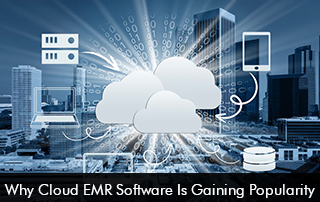From small clinics to large hospital networks, healthcare providers are increasingly adopting cloud-based EMR software due to their scalability, cost-efficiency, accessibility, and advanced security features. In this blog, we’ll explore the key reasons behind the growing popularity of cloud EMR software and how it is revolutionizing healthcare management.
1. Cost Efficiency and Reduced IT Overhead
One of the biggest advantages of cloud-based EMR software is its cost-effectiveness. Traditional on-premise EMR systems require significant upfront investments in hardware infrastructure (servers, data centers), software licenses (often expensive and inflexible), and IT maintenance and support staff.
In contrast, cloud EMR solutions operate on a subscription-based (SaaS) model, eliminating the need for heavy capital expenditure. Providers pay a predictable monthly or annual fee, which includes automatic software updates, data storage and backups, and security and compliance management.
This shift from capital expenditure to operational expenditure makes cloud EMR a more affordable option, especially for small and mid-sized practices.
2. Enhanced EMR Software Accessibility and Mobility
Healthcare is no longer confined to hospital walls—doctors, nurses, and specialists need real-time access to patient records from anywhere. Cloud EMR software enables remote access via web browsers and mobile apps, seamless collaboration among multiple healthcare providers, and telemedicine integrations for virtual consultations.
With cloud-based EMRs, physicians can review patient histories on the go, update records from clinics, hospitals, or home, and instantly share critical data with specialists. This 24/7 accessibility improves decision-making and reduces delays in patient care.
3. EMR Software Scalability for Growing Practices
Healthcare organizations evolve, clinics expand, hospitals merge, and patient volumes fluctuate. On-premise EMR systems struggle with scalability, often requiring expensive upgrades or migrations.
Cloud EMR solutions, however, offer elastic scalability. Providers can add or reduce users as needed, expand storage without hardware investments, and support multi-location practices effortlessly. Whether a practice grows from 10 to 10,000 patients, cloud EMRs can scale without disruption.
4. Robust EMR Software Data Security and Compliance
Healthcare data is a prime target for cyberattacks, making security a top priority for healthcare organizations. Many providers initially hesitated to adopt cloud EMRs due to security concerns, but modern cloud solutions now offer stronger protections than most on-premise systems.
Key Security Features of Cloud EMRs:
-
HIPAA & GDPR Compliance – Ensures patient data privacy
-
End-to-End Encryption – Protects data in transit and at rest
-
Multi-Factor Authentication (MFA) – Prevents unauthorized access
-
Automated Backups & Disaster Recovery – Safeguards against data loss
Leading cloud providers (AWS, Microsoft Azure, Google Cloud) invest heavily in enterprise-grade security, often exceeding what individual healthcare organizations can implement.
5. Automatic Updates and Minimal Downtime
On-premise EMR systems require manual updates, which can be time-consuming, disruptive to workflows, and prone to errors if not properly managed.
Cloud EMR providers handle all updates automatically, ensuring the latest features without IT intervention, zero downtime during upgrades, and continuous compliance with regulatory changes. This ensures healthcare providers always have access to the most advanced and secure version of their EMR software.
6. Improved EMR Software Interoperability and Integration
A major challenge in healthcare is data silos, where patient information is trapped in incompatible systems. Cloud EMRs improve interoperability by supporting HL7 & FHIR standards for seamless data exchange, integrating with labs, pharmacies, and wearables, and connecting with telehealth platforms.
This connected ecosystem reduces duplicate tests, enhances care coordination, and improves patient outcomes.
7. EMR Software AI and Advanced Analytics Capabilities
Cloud-based EMRs leverage Artificial Intelligence (AI) and Machine Learning (ML) to provide predictive analytics (identifying at-risk patients), automated documentation (reducing physician burnout), and clinical decision support (suggesting evidence-based treatments).
Since cloud systems have vast computational power, they can process large datasets faster than on-premise solutions, unlocking data-driven healthcare insights.
8. Disaster Recovery and Business Continuity
Natural disasters, cyberattacks, or hardware failures can cripple on-premise EMR systems, leading to data loss, treatment delays, and financial penalties.
Cloud EMRs provide built-in disaster recovery, including geographically redundant servers (ensuring data is never lost), automatic failover (keeping systems running during outages), and quick restoration of records in case of emergencies. This business continuity is critical for healthcare providers who cannot afford downtime.
9. Environmental Benefits
Cloud computing is more energy-efficient than maintaining on-premise servers, contributing to a lower carbon footprint (shared resources reduce energy waste) and reduced e-waste (no need for frequent hardware upgrades).
Healthcare organizations adopting cloud EMRs can align with sustainability goals while improving efficiency.
10. Patient Engagement EMR Software Tools
Modern patients expect digital access to their health records. Cloud EMRs enhance patient engagement through patient portals (viewing lab results, scheduling appointments), secure messaging (communicating with providers), and automated reminders (reducing no-shows).
These features improve patient satisfaction and adherence to treatment plans.
The Future of EMR Software Is in the Cloud
The shift from on-premise to cloud-based EMR software is accelerating due to lower costs & reduced IT burden, anywhere/anytime access, superior security & compliance, AI-driven insights & automation, and seamless scalability & interoperability.
As healthcare continues to embrace digital transformation, cloud EMRs will become the standard, empowering providers to deliver faster, smarter, and more patient-centered care.
Is your practice still relying on outdated EMR systems? The cloud is the future—make the switch today!








